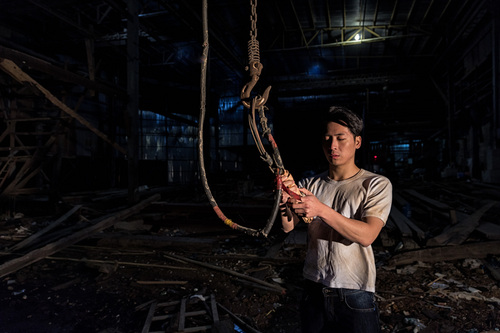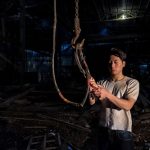 Sunset at the Shipyards
Sunset at the Shipyards
The 29th Macao Arts Festival (MAF), organised by the Cultural Affairs Bureau, kicks off this Friday, 27 April, with an opening ceremony to be held at 7:40pm in the lobby of the Macao Cultural Centre, open to the general public. This edition of the MAF presents 26 extraordinary shows and exhibitions as well as an outreach programme, in a total of over 100 activities, leading the audience to recall the core meaning of life by means of different artistic manifestations.
This edition of the MAF is themed “Origin”, which symbolises the “spring of life”. Following the themes of time and space exploration in its last two editions, the MAF explores once again a wide range of topics to broaden the audiences’ thinking about life. The opening performance the play Das Kapital takes to the stage on 27 and 28 April, presented by the Shanghai Dramatic Arts Centre, a new version of Karl Marx’s grand classic, incorporating Macao’s elements and illustrating the duality of capital making use of black humour; on the same days, 27 and 28 April, local choreographer Tracy Wong presents the dance theatre piece Les Curious Fringes – Blast of the Cave, a performance incorporating dance, visual elements and installation. Based on the performance The Victory Shipyard in 2017, the play Sunset at the Shipyards by Dream Theatre Association, to be held on 28 and 29 April, with duration of 2 hours and 15 minutes, evokes the awareness and recognition of Macao’s residents about the conservation of local culture through the history of the local shipbuilding industry; from 2 to 6 May, at the Mandarin’s House, a Portuguese artist presents the experimental theatre Parasomnia, which integrates installations with images and sounds.
The 29th MAF offers a rich variety of programmes, opening up the window for the audience to appreciate arts and broaden artistic experiences. One of the highlights of the Outreach Programme, the “Artist Talk: Tadashi Suzuki” by contemporary Japanese theatre master Tadashi Suzuki, uses The Trojan Women as an example play and shares with the audience how to recreate the theatre world through the actors’ bodies. In the “Cloud Gate 2 Workshop”, the internationally renowned dance company Cloud Gate 2 will share a physical training discipline “Tai Chi Dao Yin”, exclusively practised by Cloud Gate 2 dancers to build up the basics of dancing.
A number of pre-show talks will also be organized for the performances 32 rue Vandenbranden, The Trojan Women and The Trial by Kafka. The pre-show talk about the performance The Trojan Women, will be conducted by the assistant and translator of Tadashi Suzuki, Fang Xin, and the actor of the Suzuki Company of Toga, Gu Jing Sheng, due to the absence of the speaker Tian Chong. In addition, arts accessibility services will be made available in the shows Home Sweet Home and the screening of the movie The Posterist - The Art of Yuen Tai-Yung, in order to allow people with visual and hearing impairments to enjoy the arts without barriers. Interested parties can register online through the webpage www.icm.gov.mo/eform/event, or by phone. For more information and reservations, please call IC through tel. no. 8399 6699 during office hours.
Only a limited number of tickets are available for some of the programmes, and therefore the public is advised to purchase their tickets as soon as possible. For more information about the programmes, ticket purchase and other discounts, please check the 29th Macao Arts Festival Booklet; the booklet PDF version can be downloaded at www.icm.gov.mo/fam, follow the MAF’s page on Facebook or subscribe to IC’s WeChat account. Ticketing hotline: 2855 5555. Online ticket reservation: www.macauticket.com.
View gallery


